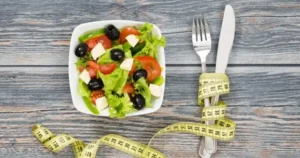Table of Contents
Is a 1,200-Calorie Diet a Sustainable Solution?
Table of Contents
- Overview of the 1,200-Calorie Diet
- Benefits of a 1,200-Calorie Diet
- Risks to Consider
- 3-Day Sample Menu
- List of Recommended Foods for a 1,200-Calorie Diet
- Side Effects Warning
- Conclusion: Is the 1,200-Calorie Diet Right for You?
Overview of the 1,200-Calorie Diet
The 1,200-calorie diet is a popular weight loss method that helps reduce weight by limiting daily caloric intake. The basic principle is to consume fewer calories than you burn. For some people, this diet can be effective for short-term weight loss and weight control. However, sustainable weight loss requires considering factors such as metabolic rate, health conditions, and individual nutritional needs.
Some variations of the 1,200-calorie diet may involve high-protein or low-carb plans, such as Dr. Nowzaradan’s program or Weight Watchers. However, the goal is not just to reduce calories but also to ensure the body receives essential nutrients.

Is a 1,200-Calorie Diet a Sustainable Solution?
Suggested Links:
Benefits of a 1,200-Calorie Diet
1. Supports Quick Weight Loss
A low-calorie diet like 1,200 calories daily helps create a caloric deficit, promoting weight loss. Studies from Montreal indicate such diets may reduce belly fat and overall body weight by an average of 8% over a short period.
2. Extends Lifespan and Reduces Signs of Aging
Some research suggests calorie restriction can lower inflammation and extend lifespan. A study published in the Journal of the American Medical Association found that calorie restriction over six months positively impacted longevity markers and reduced oxidative stress.
3. Lowers Risk of Chronic Diseases
Caloric restriction also reduces risks of chronic diseases such as diabetes, hypertension, and cardiovascular diseases. A balanced 1,200-calorie diet high in protein and low in carbs has shown benefits for blood sugar, cholesterol, and blood pressure – all of which are risk factors for heart disease and stroke.
4. Flexibility and Easy to Follow
The 1,200-calorie diet offers flexibility in food choices. You don’t have to completely eliminate your favorite foods but can adjust portion sizes or modify the quantity of other foods throughout the day.
Suggested Links:
Risks to Consider
1. Nutrient Deficiency
With a 1,200-calorie diet, there’s a risk of not getting essential nutrients without a well-planned meal plan. This can lead to deficiencies in important vitamins and minerals.
2. Slowed Metabolic Rate
Reducing calories too much can put the body in a “starvation” state, slowing down metabolism. This condition can make it harder to lose weight over time.
3. Not Suitable for Everyone
For those with specific health conditions, such as diabetes, this diet should be discussed with a doctor since reduced calories can cause major fluctuations in blood sugar levels.
3-Day Sample Menu
Day 1
- Breakfast: 1/2 cup oatmeal, 1/2 cup strawberries, 1/2 cup blueberries.
- Lunch: 4 oz grilled chicken, 1/2 cup quinoa, 1 cup roasted broccoli.
- Dinner: 1 cup zucchini noodles, 2 tbsp pesto, 4 oz meatballs with side salad.
- Snack: Apple slices with 2 tbsp peanut butter.
Day 2
- Breakfast: Scrambled eggs with spinach, mushrooms, and onions.
- Lunch: 4 oz grilled salmon, 1 cup kale, and roasted sweet potato.
- Dinner: Stuffed bell peppers with 4 oz ground turkey, onion, tomato, and 1 oz mozzarella cheese.
- Snack: Carrot sticks with 2 tbsp hummus.
Day 3
- Breakfast: 1 cup Greek yogurt with 1 tbsp chia seeds and sliced kiwi.
- Lunch: 3 oz marinated tempeh, 1/2 cup brown rice, cauliflower.
- Dinner: 4 oz garlic grilled chicken breast, 1 cup broccoli, 1/2 cup spiced couscous.
- Snack: 1 cup fruit and almonds.
List of Recommended Foods for a 1,200-Calorie Diet
- Fruits: Apples, bananas, oranges, peaches, plums, watermelon, berries.
- Vegetables: Asparagus, kale, spinach, onions, garlic, mushrooms.
- Lean Meats: Beef, venison, chicken, turkey.
- Seafood: Salmon, tuna, sardines, cod.
- Whole Grains: Brown rice, quinoa, oats.
- Healthy Fats: Olive oil, avocado, coconut oil.
Side Effects Warning
For some individuals, a 1,200-calorie diet can cause symptoms like fatigue, low energy, and increased hunger. Maintaining this diet long-term can put the body into an energy-conserving state, slowing metabolism, also known as the “energy preservation mode.”
Advice: Gradually increase calorie intake by about 100 calories weekly after reaching your weight goal to maintain effectiveness.
Conclusion: Is the 1,200-Calorie Diet Right for You?
A 1,200-calorie diet can be a quick weight-loss tool, but it doesn’t necessarily have to be a sustainable solution. Sustainable weight loss requires a balanced diet and regular exercise. Note that excessive calorie reduction can have negative impacts on health.
The 1,200-calorie diet may be better suited for individuals with a sedentary lifestyle or those who can closely adhere to a structured meal plan. However, if long-term, sustainable weight loss is your goal, consult a nutritionist to ensure a healthy, safe diet.